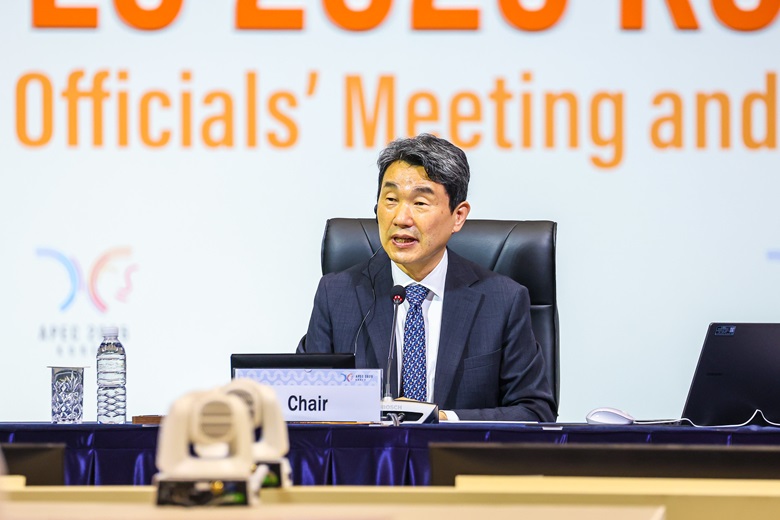Acting President Lee Urges Education Reform in AI Era

Education ministers from 21 APEC member economies convened in Jeju, for the 7th APEC Education Ministerial Meeting (AEMM), reaffirming their shared commitment their shared commitment to narrowing the education gap and promoting sustainable growth through innovation, inclusivity and strengthened global cooperation.
Held under the theme “Bridging Educational Gaps and Promoting Sustainable Growth in the Era of Digital Transformation: Innovate, Connect, Prosper,” the meeting addressed the urgent need for education systems to adapt in an era shaped by rapid technological advancements and global complexity.
Welcoming delegates to Jeju—described as “an island of peace and life, and a place that symbolizes Korea’s vision for sustainable innovation”—Acting President, Deputy Prime Minister and Minister of Education Lee Ju-ho expressed appreciation for the presence of each delegation and emphasized the historic significance of the gathering.
“This year marks the 36th anniversary of APEC’s founding and the 32nd anniversary of its first summit,” said Acting President Lee.
“APEC has served as a model of international cooperation in the post-Cold War era, rooted in dialogue, compromise and mutual understanding,” added Acting President Lee. “It has continued to embody a spirit of unity and resilience through numerous global challenges, from the Asian and global financial crises to the COVID-19 pandemic.”
Ministers discussed the need to reimagine education in light of accelerating digitalization. Artificial intelligence, demographic shifts and widening socioeconomic disparities are placing new demands on learners, educators and policymakers alike.
“Artificial intelligence and digital technologies are not only transforming industries, but also fundamentally reshaping the structures of our economies, societies and cultures,” Acting President Lee said. “In this time of profound and rapid change, education must serve as the central axis of our collective response.”
Central to the discussions was the imperative to place learners at the heart of education reforms. Member economies shared policy approaches to modernize learning systems, expand equitable access and prepare citizens with the skills and values needed for the future.
Acting President Lee underscored that “learners must be placed at the heart of all transformation,” emphasizing that “human potential is the foundation of sustainable prosperity, and no society or economy can thrive without education.”
He highlighted Korea’s ‘classroom revolution led by teachers’ as a key example of the country’s ongoing education reform efforts. This innovation, centered on AI-based digital textbooks, offers a new paradigm in education: enabling teachers to design personalized instruction based on learner data and allowing all students to learn at their own pace and level.
Acting President Lee also noted that 2025 marks the 30th anniversary of Korea’s May 31 Education Reform. “The vision of globalization and digitalization articulated at that time is now being realized in our classrooms,” he stated.
Beyond primary and secondary education, Korea is also transforming higher education to support innovation-led growth and regional resilience. Universities are evolving into hubs of co-creation; partnering with local communities, industry and international institutions to advance solutions to real-world challenges.
“Korean universities are emerging as hubs of regional innovation—advancing technology in collaboration with industry, addressing local challenges alongside public institutions, and co-creating solutions with global partners,” Lee noted.
Throughout the meeting, ministers reaffirmed the importance of collective action to address the challenges of the digital era and ensure no learner is left behind.
“No economy can navigate these transformations alone. Education does not advance in isolation. Achieving education for all requires mutual respect, the sharing of experiences, and collective action,” Lee said. “This is the very spirit that has sustained APEC’s education cooperation over the past 30 years.”
Looking ahead to Korea’s role as host of APEC in 2025, Acting President Lee called for deeper collaboration among member economies to build a future where technology and humanity grow together.
“As the 2025 APEC host economy, the Republic of Korea is committed to leading efforts to build a more inclusive and sustainable Asia-Pacific community, grounded in the core values of innovation, connection, and prosperity,” he said. “APEC must advance together toward a future where people and technology grow in harmony.”
“Education is not merely the transmission of knowledge, but the most powerful means of shaping our shared future,” Acting President Lee concluded, describing the meeting as “a turning point for APEC education cooperation.”
For more information or media inquiries, please contact:
[email protected]

